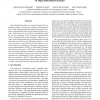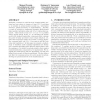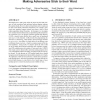23 search results - page 4 / 5 » Integrity-Preserving Replica Coordination for Byzantine Faul... |
112
click to vote
NCA
2007
IEEE
15 years 6 months ago
2007
IEEE
Open distributed systems are typically composed by an unknown number of processes running in heterogeneous hosts. Their communication often requires tolerance to temporary disconn...
87
Voted
ESAW
2009
Springer
15 years 6 months ago
2009
Springer
Replication is widely used to improve fault tolerance in distributed and multi-agent systems. In this paper, we present a different point of view on replication in multi-agent syst...
98
Voted
SAC
2010
ACM
15 years 6 months ago
2010
ACM
Byzantine consensus in asynchronous message-passing systems has been shown to require at least 3f + 1 processes to be solvable in several system models (e.g., with failure detecto...
107
click to vote
SOSP
2007
ACM
15 years 8 months ago
2007
ACM
Researchers have made great strides in improving the fault tolerance of both centralized and replicated systems against arbitrary (Byzantine) faults. However, there are hard limit...
87
Voted
SRDS
2007
IEEE
15 years 5 months ago
2007
IEEE
Fault tolerant distributed protocols typically utilize a homogeneous fault model, either fail-crash or fail-Byzantine, where all processors are assumed to fail in the same manner....



